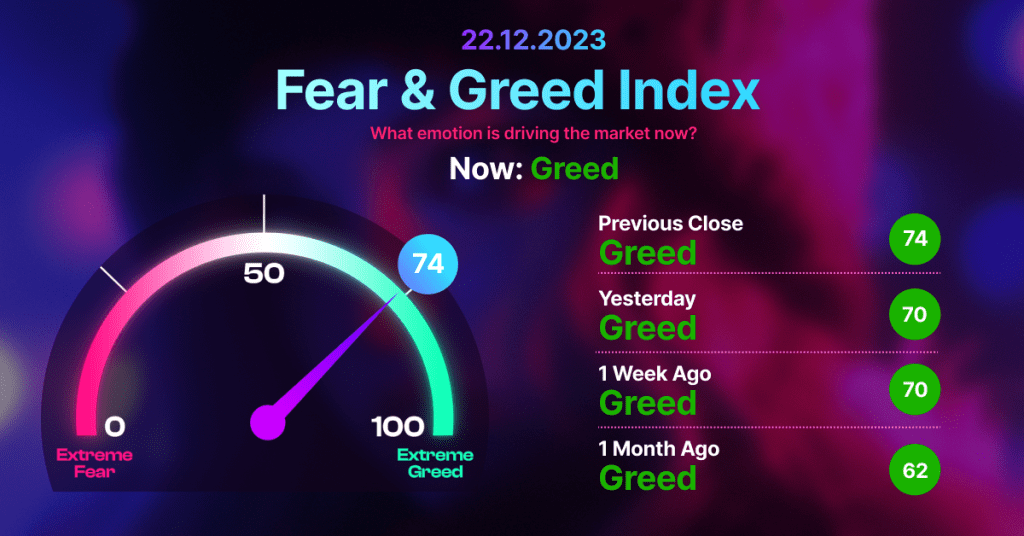El Salvador approves law granting citizenship to Bitcoin investors; Testing of the Ethereum ‘Dencun’ upgrade is now scheduled for the 17th of January; Solana just flipped BNB on market cap
Solana (SOL) has experienced an 18% surge in the last 24 hours, propelling it to the fourth spot in market capitalization, surpassing Binance Chain’s BNB for the first time in over two years. Solana’s market cap reached $41.9 billion, slightly overtaking BNB’s $41.8 billion. SOL is currently priced at $98.40, marking an 18% increase for the day.
This recent surge comes on the heels of Solana surpassing XRP in market capitalization on December 21. Over the past week, SOL has gained more than 30%, outperforming other major cryptocurrencies. Despite these gains, Solana still has a significant gap to close to reach Ethereum’s market cap of $269 billion.
The last time Solana held the fourth position was in November 2021, with a market cap of $75 billion, trailing behind BNB at $108 billion. Solana faced challenges in 2022, closing the year below $10, largely due to its association with the now-defunct FTX exchange and former crypto billionaire Sam Bankman-Fried. In 2023, SOL has surged to almost $100, emerging as one of the year’s best-performing crypto assets.
Google Trends data also reflects a notable increase in searches for Solana, closing in on Ethereum searches, especially in the United States. While Solana’s recent success has been celebrated, technical analysts caution about the potential for a significant market correction before the year concludes.
In a year-end review on December 21, the Solana team highlighted key events, including the BONK hype, the launch of the Saga mobile device, AI integration, and institutional partnerships, during the “Solana Solstice” celebration.
El Salvador approves law granting citizenship to Bitcoin investors
El Salvador’s Congress has approved an immigration law granting accelerated citizenship to foreigners who donate Bticoin to government social and economic development programmes.
The law passed the country’s legislature on 21 December with the support of Nayib Bukele’s New Ideas party, Reuters reported.
The law is expected to come into force in the coming days.
Bukele temporarily stepped down as president for the presidential elections to be held on 4 February 2024. Bukele led the Bitcoin revolution in the country, making BTC an official currency in September 2021.
Although the government of El Salvador did not make an official statement on the new law, the country’s National Bitcoin Office (ONBTC) retweeted several X posts sharing the news. ONBTC is a special administrative unit that manages all Bitcoin and cryptocurrency projects throughout the country.
Cointelegraph contacted El Salvador’s National Bitcoin Office for comment but has not yet received a response.
According to Reuters, the bill is a “vital interest” of Bukele.
The bill refers to “altruistic foreigners interested in supporting the economic, social and cultural development of El Salvador by donating bitcoins”.
Reuters said the law does not specify a minimum donation requirement.
The development came about two weeks after El Salvador launched the Bitcoin “Freedom Visa” for foreigners who want to invest $ 1 million BTC or Tether (USDT) in the Central American country.
Testing of the Ethereum ‘Dencun’ upgrade is now scheduled for the 17th of January
According to a note published on Ethereum’s official Github, Ethereum’s upcoming “Cancun-Deneb” (Dencun) upgrade is entering the testing process on 17 January. The upgrade will first be implemented on the Goerli test network and will be added to Sepolia on 30 January and Holesky on 7 February. The Ethereum team has not announced when Dencun will be implemented on the main network.
The new upgrade includes several tools aimed at lowering fees, allowing new features of bridges and stake pools, and limiting the use of self-destruction in smart contracts.
According to developer documentation, Dencun will include Ethereum Improvement Proposal (EIP) 4844, also known as “proto-danksharding”. This will allow layer-2 roll-up networks such as Arbitrum, Base and Polygon zkEVM to temporarily store certain transaction data using a new format called “blobs”. While blobs can be deleted after 18 days, the new goal will be to keep the data on the blockchain forever by including it in the CALLDATA field. Ethereum developers believe that proto-danksharding will significantly reduce transaction fees on Layer-2s.
The upgrade also includes several other proposals, including EIP-4788, which increases transparency along with EIP-1153, which introduces a “temporary storage” system to further reduce fees. Developers expect the data provided by EIP-4788 to be used in new features for bridges and staking pools.
Dencun also includes EIP-6780, a proposal to limit the use of the keyword that allows for self-destruction. This feature, if included in a contract prior to deployment, can be used to erase the code of a smart contract and send all its funds to the account that deployed it. Following Dencun, this keyword will transfer all funds to the distributor, even if it is included in a transaction.
Ethereum upgrades are usually subjected to testing for several months before being released on the main network. The previous upgrade, known as Shapella, began testing on 7 February and became available on the mainnet on 12 April.


